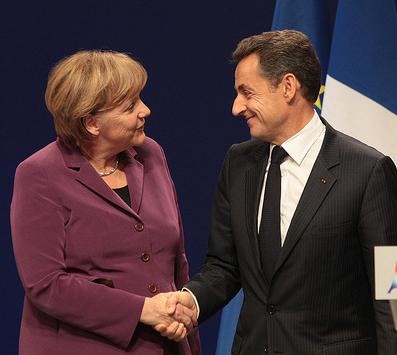Not a whisper as Germany and France take over

It has been a dismal seven days, not just because of the events of the week, but also for what those events portend. By Vincent Browne.
The spectacle of Angela Merkel and Nicolas Sarkozy summoning George Papandreou to account, and threatening Greece with expulsion from the eurozone, was a chilling insight into the new reality in the European Union.
The promises that the EU would be a safe haven for smaller nations, whose interests would be protected by the EU's institutional structures, were rendered at nought. Merkel and Sarkozy had no authority to summon anybody outside their own jurisdictions to anywhere. They had no authority to threaten any member state with expulsion from the eurozone and no authority to dictate the question that might be put to the Greek people in a referendum on the rescue package.
Yet none of the office holders of the European Union - not José Manuel Barroso, president of the EU Commission; not Herman Van Rompuy, president of the European Council; not the President of the European Parliament (whoever that is); nor any other head of government in the European Union - uttered a whisper of concern about this impertinent usurpation of power.
Of course, Papandreou had behaved capriciously in negotiating a rescue package and not informing those with whom he was negotiating that he intended putting the deal to a referendum before concluding it. But the indignation over his impulsive decision to opt for a referendum far surpassed his lack of collegiality.
That indignation was impelled, in part, by alarm that the sovereign people of a member state would have any direct say in an EU decision, however relevant to those whose lives would be affected by that decision.
We had known since the defeat of the EU constitution in referendums in France and the Netherlands in May and June 2005 how the EU resents the usurpation of its projects by the populace. Following those defeats, the EU constitution was redrafted in the form of the Lisbon Treaty in ways that bypassed the necessity for popular approval in all member states but Ireland. Then, when Ireland's presumptuous populace voted against, they were made to vote again - this time under threat.
Now, it seems, not alone are the people of Europe to be sidelined, but so are the institutions and protocols of the EU and the other governments of the EU, leaving the way free for Germany and France to do as they wish.
A spin will be put on all this to soften the appearance, but the reality is that Germany and France - if not Germany alone - are the powerhouses of the EU and will act, if they choose to, without the restraints on which the European Union is constructed.
The other dismal event of last week was the payment of €700 million to unsecured Anglo Irish Bank bondholders. There was no legal requirement to pay this. There was nothing in the EU/IMF agreement to demand this. The payment was made because the European Central Bank (ECB) said so, and a submissive Irish government submitted.
Fine Gael said in its manifesto a mere nine months ago: "Fine Gael believes that the IMF-EU bailout deal has not and will not restore investor confidence in our country, and must therefore be renegotiated to reduce interest rates and to ensure a fair sharing of the cost of fixing Ireland's broken banks. The current deal is bad for Ireland and bad for Europe."
Later in the manifesto, it said: "Fine Gael in government will force certain classes of bondholders to share in the cost of recapitalising troubled financial institutions. This will be done unilaterally for the most junior bondholders, but could be extended - as part of a European framework - to senior debt, focusing on insolvent institutions like Anglo Irish and Irish Nationwide that have no systemic importance."
Labour said more or less the same, along with that celebrated bombast: "It's Frankfurt's way or Labour's way."
Yes, there has been - or will be - a reduction in the interest rate, for reasons that have nothing to do with our intrepid negotiators. However, there has been no fair sharing of the costs of fixing the banks - indeed, no fair sharing of the costs of protecting German and French banks from the consequences of us deciding, in our own interests, to default on secured bondholders.
But that Ireland alone should fully bail out unsecured bondholders and that the Irish government would not go to the markets to buy back those bonds at the lower rate they were selling for some months ago, to minimise the cost of a bailout, is cause for despair.
It speaks of an abject submissiveness that is as humiliating - or almost so - as that which the nation felt almost a year ago when the IMF and EU arrived to take away our sovereignty.
We can be assured that this government will utter not a word of complaint over the imperious conduct of Merkel and Sarkozy. Even if all that can be obtained from them is a photo opportunity for our ingratiating Taoiseach, sure, that's something.
Image top: francediplomatie.
